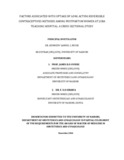| dc.contributor.author | Busse, Kennedy S L | |
| dc.date.accessioned | 2018-01-22T06:53:41Z | |
| dc.date.available | 2018-01-22T06:53:41Z | |
| dc.date.issued | 2016 | |
| dc.identifier.uri | http://hdl.handle.net/11295/102474 | |
| dc.description.abstract | Background: Family planning is important for prevention of short inter-pregnancy intervals and reduction of maternal and child morbidity and mortality. While most health facilities in South Sudan provide long acting reversible contraceptive methods (LARC) Ministry of health and UNFPA reported/2014(1), the uptake is still low, especially among the postpartum women. The postpartum period presents an opportunity to counsel and provide LARC to the mothers. This study was therefore conducted to assess factors that influence LARC uptake among post-partum women at twelve weeks postpartum at Juba teaching Hospital.
Objective of the study:
The objective of the study is to determine factors that influence uptake of LARC among the postpartum women attending maternal and child health clinic at the Juba teaching hospital.
Method: A cross sectional study was conducted at Juba teaching Hospital, South Sudan, from April 2016 to May 2016. Postpartum women attending care at 12 weeks after delivery, and willing to participate were recruited into this study. Data were collected at 12 weeks postpartum using a structured questionnaire to determine postpartum contraception utilization of LARC and factors associated with its use.
Results: The mean age of the postpartum mothers was 25.4 (SD ± 5.1) years. Among the participants 129 (43.7%) mothers reported ever receiving prior FP counselling and 69 (23.4%) had ever used any FP method. During the postpartum period a total of 18 out of the 295 participants reported use of LARC yielding an uptake of 6.1% (95% CI 3.7 to 9.5%), and all 18 mothers used implants. LARC uptake was significantly associated with mode of delivery (OR 3.71; 95% CI 1.23-11.24), early resumption of sexual activity (OR = 4.84, 95% CI 1.68-14.0), discussions with provider (OR = 5.15, 95% CI 1.46-18.20).
Conclusions: The prevalence of LARC uptake was low. If IUD and Implant use are to be expanded in South Sudan, potential users will need education about the methods and providers will need training on counselling and provision. Factors found to be associated with LARC use should be utilized by the South Sudanese government in its family planning awareness campaign. Changes in attitudes toward LARC among South Sudanese may increase their practice of LARC. | en_US |
| dc.language.iso | en | en_US |
| dc.publisher | University of Nairobi | en_US |
| dc.rights | Attribution-NonCommercial-NoDerivs 3.0 United States | * |
| dc.rights.uri | http://creativecommons.org/licenses/by-nc-nd/3.0/us/ | * |
| dc.title | Factors associated with uptake of long acting reversible contraceptives methods among postpartum women at Juba Teaching Hospital: a cross sectional study | en_US |
| dc.type | Thesis | en_US |
| dc.description.department | a
Department of Psychiatry, University of Nairobi, ; bDepartment of Mental Health, School of Medicine,
Moi University, Eldoret, Kenya | |



